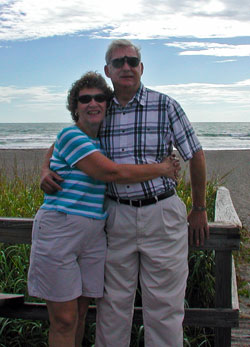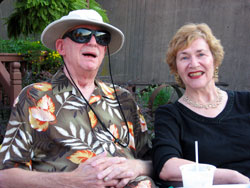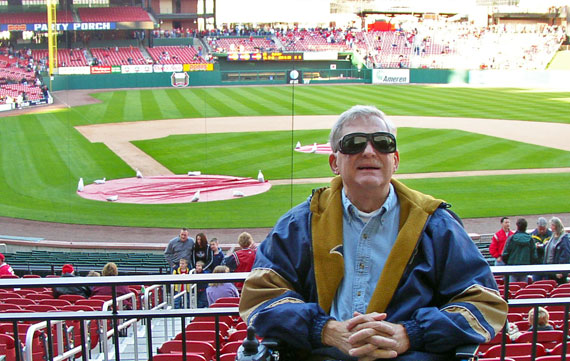Sandra Magnus’s Story
Dad passed away three years ago on Easter but the lessons he taught me, not just about living, but also about dying, are still strong and vivid. Nine years ago, Dad was diagnosed with PSP. Mom, who had been trained as a nurse and had the perfect background to deal with the situation, filled the family (my two sisters, brother, and I) in on the details once the exact diagnosis was confirmed. We sat there, stunned, as we learned and absorbed the reality that Dad had somewhere between 5-15 years to live and that, over that time frame, his body and mind would slowly decay. This was new territory for all of us – how to say goodbye or even imagine having to say goodbye to a parent.
From the beginning, Mom and Dad faced the problem head on and with a positive attitude. They determined that they were going to live life to the fullest. The plan was to deal with symptoms and a deterioration of Dad’s condition as they appeared. In the meantime the visits to the grandkids, the participation in the Grange, local family visits, exercise walks in the mall, and anything else my energetic Mother could come up with, would continue.
Dad’s eyesight was the first thing to start failing, so he had to give up driving. He used to joke that it probably was better that he couldn’t bear witness to Mom’s “lead foot” driving. Sometimes, in the process of standing up or sitting down, Dad’s balance would fail him and he would fall, landing on the floor in a heap. My father, a fairly quiet man who never liked being the center of attention, was undoubtedly embarrassed when these episodes occurred, especially in public. Everyone in the vicinity would turn to look at him, perhaps speculating that he had too much to drink. But he had a wonderful sense of humor and we started treating his falls like a scored Olympic event, giving him 10’s for good, stylish falls and 2’s for the not so graceful ones. We even discussed techniques required to achieve a top score and emphasized, in the end, it was “all about style.” It was the way all of us, Dad included, were able to cope – using humor to deal with the situation.
Dad was not a saint and did complain from time to time about his failing eyes. He maintained an impish sense of humor, taking advantage of his situation from time to time when he thought he could earn sympathy. Once, I came into the living room where Dad was watching a soccer match, and he made a comment about how hard it was to watch TV. After sitting companionably with him for several moments, I asked him what the score was and he told me. The score was posted in small numbers up in the left hand corner of the screen. I said, “Dad, how can you know what the score is if you can’t see the TV?” He knew I had caught him out and we both started laughing.

As Dad’s eyes deteriorated further, so did his balance problem. No longer was just getting up or sitting down a problem, but walking became difficult. He eventually needed a cane, graduated to a walker, and for the last year or so, used a wheelchair. Though it was harder for Dad to get around, my parents continued a fairly active lifestyle. Babysitting the grandkids in St. Louis remained a high priority, even when Dad was more or less confined to the couch. A common game that they played with the grandkids was “ambulance.” Dad would sit on the couch and my Mom and the kids would get bandages and wrap him up, as if they were EMTs. As they wrapped his arms and legs Dad tried to reach out and tickle them. The other grandchildren were in Chicago which, as far as my Mom was concerned, could have been just down the block instead of a five hour drive north. A drive to Chicago may have been an insurmountable concept for many, especially with my Dad’s condition, but for my parents it was of a moment to pack the wheelchair, walker, or whatever other support equipment my father required, get in the van and on the road and head up to my sister’s house on the outskirts of Chicago. They even drove to Texas a few times, mainly to visit my other sister who lived in Dallas, but once coming as far south as Houston to visit me. It was this way that my parents tried to normalize the disease so the rest of us could deal with it. My parents were determined that their grandchildren should develop some strong memories of their grandfather.
As the disease progressed further, affecting Dad’s throat muscles, he started to loose his ability to speak. At first, he just spoke softer and slower, but his voice continued to decline to a mere whisper. In the end, only certain sounds and syllables were possible. Once at a family gathering, I was filling my father in on the things happening in my life, when he asked me a question that I didn’t understand. I put my ear to his mouth, plugged my other ear with my hand to hear better, and asked him to repeat his question. After a couple of tries, I still did not understand what he was saying. I got down on my knees in front of him and told him that I was going to go through the alphabet and that he was to stop me when I got the letter of the first word he was trying to say. I got all the way through the alphabet and he had not responded. I tried again – no luck. I finally said in a teasing tone, “Dad, I have gone through twice. Surely I have said the first letter of the word you are trying to say. Are you speaking in Russian or German? (He knew some of each of those languages) I know it has to be one of those letters.” It was hard to get an answer from him because he had started laughing. In the end, we were both laughing so hard, because it was so ridiculous trying to communicate this way. We eventually gave up because the laughter was interfering with his ability to say “yes” or “no” when I did come across the right letter. These are some of the most precious memories I have of this time period – my Dad and I laughing together as we shared some of the weird quirks of the disease that had captured him. For both of us, frustration turned to humor as a tool to cope. It was hard, after all, to watch your father slowly dying, bit by bit.

As the disease worsened, my father, a fiercely independent man, became more and more dependent on my mother. They had devised a strategy for how to deal with it. My parents moved to a house that was designed for the handicapped and had wheelchair access. It was also a place my Mom could live comfortably after Dad passed. Mom bought a special lift chair that helped Dad move between sitting and standing positions. In addition, Dad used arm weights while sitting to help increase his strength and maintain some degree of mobility. My parents continued to devise ways to keep Dad mobile, succeeding almost until the end. Dad only became housebound within the last four months of his life. Through it all they were partners, Dad helping Mom to care for him as much as he could. He was determined to fight to the end but had decided that no artificial means would be used to keep him alive.
Thus, finally, his body could handle no more. His throat muscles deteriorated to the point where he could no longer eat. After that it was just a matter of time until he wasted away. We were there that last week, all of us, at home with him and Mom. Weak as he was, he got up and came to the living room all but the last three days. The last three days, as his body shut down due to lack of nutrition, he could not summon enough energy to get out of bed. At this point he had lost all ability to talk but we had devised a system of communication where we would ask him questions with a yes or no answer and he would answer with his fingers; one finger meant no and two meant yes. His body finally quit on him early in the morning of Easter Sunday, after a 6 year battle. The disease may have taken away his control of his body, but never did dampen his spirit or destroy his dignity and humor.
The lesson that he and my mother taught all of us was about how to face adversity and maintain a positive attitude, even in the face of death – a lesson I will never forget. How easy would it have been to sit and bemoan his fate, complain all of the time, or not accept the reality of what was happening to him to the point that he became a burden on my mother? Dad never succumbed to that. He was an active partner with my mother in managing the disease and fought the progression as much as he could. He maintained a sense of humor and whatever internal frustrations and anger he had were kept out of our sight. For his children, he had one last lesson to teach.